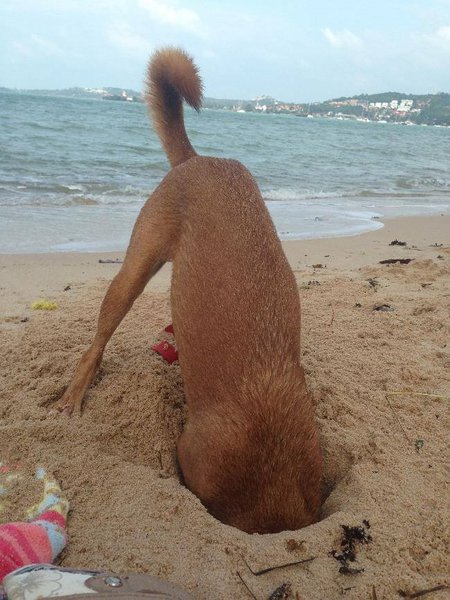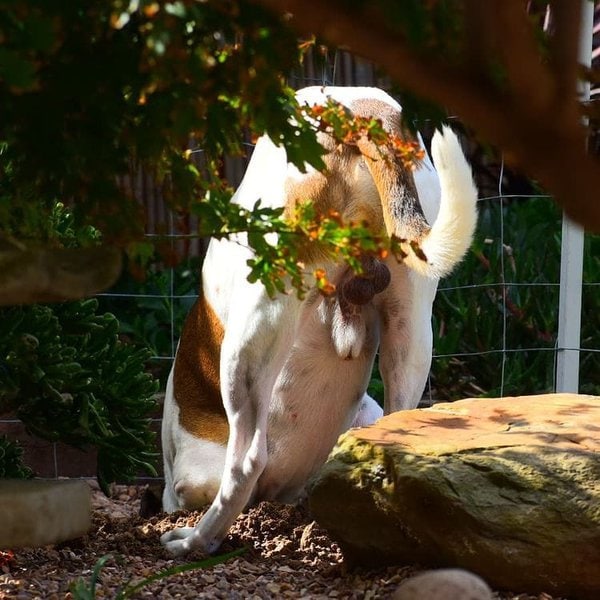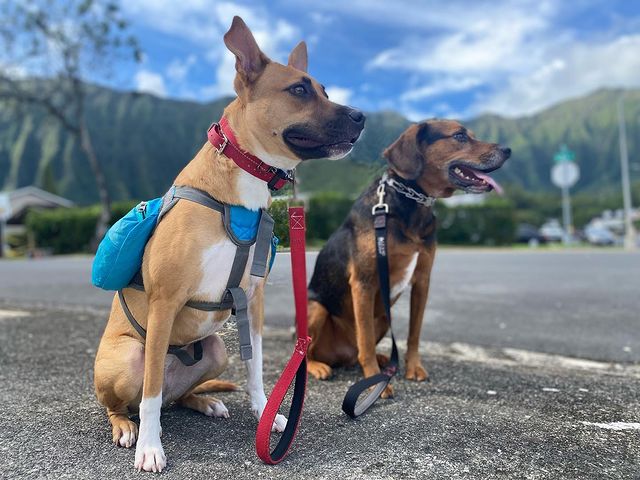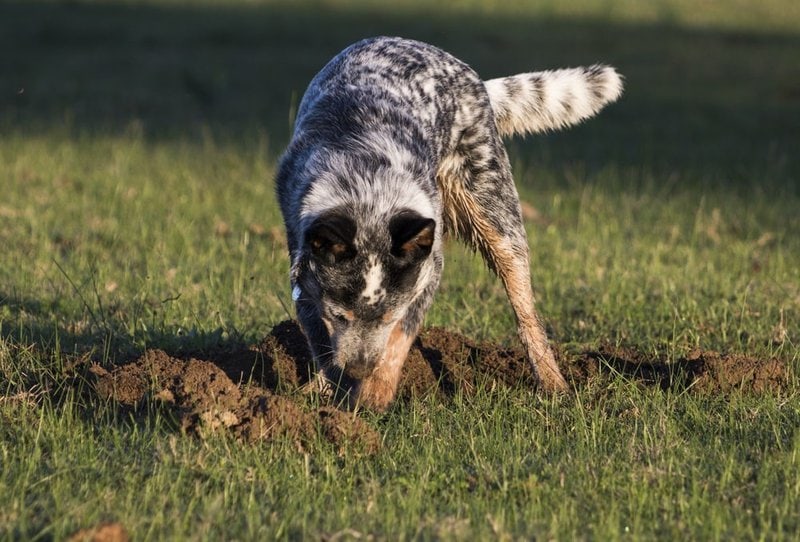One of the strange and amusing behaviors we encounter our dogs doing is digging and burying things. Even though we provide them with enough food and toys, they still have the habit sometimes of burying their food as if it is in danger of being taken away from them. So, why do dogs keep burying things?
Dogs bury things, like food and toys, mainly because it is a behavior they inherited from their ancestors. It is a way of survival mechanism where concealing food and retrieving it for later consumption allows dogs to keep resources that are otherwise in short supply.
In this article, we will understand in greater detail the root of this instinctive behavior and the number of reasons why this behavior persists in domesticated dogs.
Plus, we’d also touch on the ways we could minimize or stop the burying behavior, more so if it somehow becomes compulsive. Or, perhaps, you simply want to prevent your backyard from looking like the surface of the moon. So without further ado, let us dig deep, shall we?
Why Does My Dog Keep Burying Things?

It could be any of the following: instinct, anxiety, wants to get your undivided attention and the breed of your dog.
In this section, we’d talk more about those reasons and why your dog would use its 2 front legs to scoop out a certain area in the ground or scratch a deep portion of your sofa to bury things with its nose and keep its treasure safe.
Instinct
Burying food is one of the natural instincts our domesticated dogs inherited from their wild and ancient cousins, like the wolves and coyotes. Wolves buried their food as a way of keeping it away from scavengers, predators, or other members of the pack.
Surviving in the wild was the utmost concern of every pack and the smell of fresh meat attracted other predators in the area that could steal or partake in the bounty they had just killed.
Burying leftover meals also allowed them to access food that may otherwise become scarce during the winter or leaner months. The cold ground served to keep the food preserved and fresh. Spoilage was less likely to happen when the food was kept away from direct sunlight and the elements.
Domesticated dogs inherit this behavior by burying things other than food. When you give your dog too many toys, it may have the urge to bury some of them for safekeeping. Its need to keep surplus resources is very much ingrained in its instinct.
Anxiety
Chronic stress or anxiety could also be a source of incessant digging and burying since this can be a calming or self-soothing behavior for your fur baby.
Dogs from puppy mills or rescued dogs are likely to show this behavior as a way of protecting and keeping safe the food they have. It is also noticeable in households where there is more than one dog.
Once a dog finds that the environment it is in is safe, the digging and burying would minimize.
Seeking Attention
Dogs get bored just like we do. They need mental and physical stimulation and when they do not get it from their owners, they may use digging and burying as an outlet for their boredom.
You may find one pair of your socks missing or a slipper getting pilfered and buried somewhere. This may be just one way of trying to get your attention for some playtime or reminding you to take it out for a walk.
Dog Breeds
Hunting breeds that like to chase and hunt may be more predisposed to burying things. Hounds, Terriers, Beagles, and Dachshunds are all bred for hunting and may have the tendency to keep and save their assets, like food, bones, or whatnot, as part of their hunting instincts.
Basset Hounds, for instance, are scent-driven dog breeds whose main task back then was to hunt for badgers and rodents deep in the ground.
Their strong feet and nails make them great diggers and the instinct to hunt and dig is still very much part of their character. Left to their own devices, Basset Hounds would gladly hunt on their own.
Do Dogs Remember Where They Bury Their Things?

Yes, they do remember and there are two ways their brain processes it – through spatial and associative memory.
Wild dogs and wolves are known to be “scatter hoarders”, meaning they hide their leftovers over a large chunk of the area, and this behavior was passed on to our domesticated dogs.
So, even if your backyard covers a large area, you can be sure your furry pet would definitely locate its stash even though it has hidden it days before.
Spatial Memory
Dogs use spatial memory to map out their home and the places they visited. This memory helps them in locating where their food and water bowls are usually placed, their bed, and even their way home.
They can judge a certain place to be favorable or not. A “good” place is where food can usually be found and “bad” could be the dreaded grooming salon where it can cause them stress.
Studies have shown that this is how dogs remember where they bury their food as being a “good” place.
Associative Memory
Dogs do not remember events or things in sequential order. In fact, studies have shown that they forget things as easily in two minutes.
Rather, they “associate” a certain thing, activity, or person by remembering how it smelled, tasted, or sound. They use their senses to make sense of their world.
Just like they would associate going outside for a walk when they smell and see you wearing your walking shoes or the way they would stay away from a lemon because they associate it as smelling offensive.
This is how they remember where they buried a treat or a bone by associating a certain area with the sight and smell of it. It triggers their memory when they see and smell a particular place to dig up their hidden stash.
How Do I Prevent My Dog From Burying Things?
It is part of a dog’s natural instinct to dig and for the most part, it is completely normal. But sometimes, compulsive digging could create problems to the point that their paws become sore and injured.
Here are some ways you can do to prevent it from overly digging and burying.
Physical And Mental Stimulation
Taking your dog for a regular walk or providing ample playtime with you or other dogs helps minimize a dog’s compulsion to dig and bury.
Walking can be the most exciting part of the day for a dog because of the opportunity to explore the surroundings. Plus, walking also stimulates the brain by discovering new smells.
You can also provide puzzle toys or food dispensing toys. Keeping your fur baby busy would distract it from some compulsive behaviors.

Redirect Its Behavior
Another way to stop compulsive digging is to distract your dog while it is busy doing it. You can call its attention by whistling or gently calling its name and then redirect his activity to another task.
It is important to reward your dog with positive reinforcements every time it does something you want. This way, your dog would not think that it is being punished for compulsively digging and burying things in your backyard or around the house.
Go Easy On The Toys
Do not spoil your dog with too many toys. I know that can be hard since we want the best for our furry baby. But, limiting toys and treats would give fido less reason to stockpile things.
Having too many toys motivates your dog to bury things. It is recommended that you limit its access to just 1 or 2 toys at a time and rotate it with other toys if it has too many of them.





